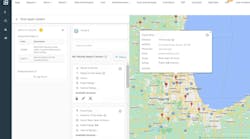Manager: David Cohen
Title: Executive vp
Fleet: Standard Oil of Connecticut, Bridgeport, CT
Operation: Family-owned heating oil company that also offers home security systems and personal insurance services
PROBLEM
It's an issue facing many fleets large and small operating everything from big rigs down to light-duty vans — how to be more “green” while cutting operating costs at the same time. Solving that ticklish dilemma is even more problematic for fleets serving industries with a decidedly less than positive green image, such as the home heating oil business. But that's not deterring those companies in the slightest.
“As a company that works in the oil industry, we have a strong commitment to preserving the environment,” says David Cohen, executive vp of Standard Oil of Connecticut. “The challenge we face is how to change things to benefit not only the environment, but our own bottom line as well.”
Engine oil changes were one of those things Cohen personally identified as an area where cost savings and environmental benefits could be achieved simultaneously. Standard Oil operates a fleet of 50 heavy- and medium-duty trucks along with 60 light-duty cargo vans, with the vans on a short engine oil change interval of just 3,000 mi.
“We've been using synthetic oil for some time and I kept asking myself, why are we changing out oil so frequently? We don't change the radiator fluid that much,” he says. “It seemed like a wasteful — and expensive — practice.”
Part of the reason for the frequent oil changes centered not so much on the oil itself but what accumulated in it. Conventional motor oil filters can only filter out particles down to 25 to 40 microns in size, but the problem is that most of the particles that cause engine wear are between 3 to 10 microns in size so they are not filtered. Therefore, after only 3,000 to 5,000 mi., most engine oil becomes contaminated with these small particles and must be changed.
SOLUTION
To get better engine oil filtration, Standard Oil tested and then adopted the microGreen filter developed by Valhalla, NY-based SOMS Technologies. Introduced in October 2008, the microGreen filter combines a conventional filter with a second micro-filter to capture particles down to 2 microns, so the oil is kept exceptionally clean and can last much longer.
Standard Oil initially tested the filter on several of its GMC 2500 one-ton gasoline engine powered service vans and received oil analysis reports from an independent laboratory to monitor the filter's effectiveness. The results showed it could extend oil drains safely out to 30,000 mi. due to the removal of those small particles, so Cohen quickly had them installed on all of the company's service vans at the end of last year.
“Even in the severe stop-and-go environment we work in, the oil sampling we conducted showed the oil continued to get better even as it got older in terms of protecting the engine,” Cohen says. “It offers us a nice combination benefit by first reducing the amount of engine oil we consume, which helps the environment; and second, it's a nice savings for us too in terms of reducing the oil and labor needed for oil changes. It's up in the $10,000-a-year range in terms of savings.”
Only available for light-duty vehicles now, Cohen plans to expand Standard Oil's use of the microGreen filter when it reaches the market for heavier truck classes.
“The filter lowers our costs significantly, is better for our vehicles and is much kinder to the environment,” he says. “It's a winner from every point of view.”
Maintenance Bay presents case studies detailing how fleets resolve maintenance-related issues.


